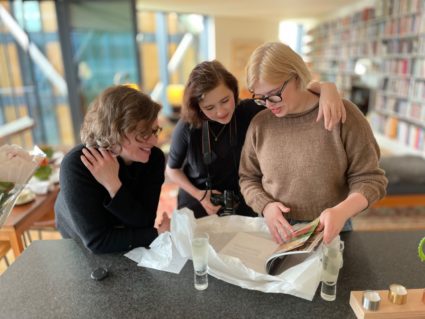in memoriam
My beloved grandfather has died. I asked my mother’s permission to talk about him here, because I have never written about him before and I would like to.
Firstly, it is no tragedy. He was in his mid 90s and absolutely not aware of his surroundings anymore, and it was more than time to go. But his going made me think of the 30 years he was part of my family, and how he changed my grandmother’s life.
He was not really my grandfather at all, he was my step-grandfather. My mother’s father died on the examining table having his retirement checkup when I was 12, leaving the house one morning never to return, his doctor taking off his white coat and walking down the road bearing my grandfather’s name, to knock at the door and tell her he had died, in the hospital wing again bearing my grandfather’s name. He was a big man in a tiny town in southern Indiana and every last thing in that town that could be named for him was.
My grandfather’s best friend, when he died, was a man twice married and once widowed, somewhat younger than he and very much the moral compass of their social circle: “I never met a finer man,” my grandfather said. They raised their children together, went to the Elks Club together, and fished together, on long manly trips into the Wisconsin lake countryside to smoke their pipes, drink their Kentucky bourbon, and fish. After my grandfather died, this man (Leonidas was his name although all called him Lon), comforted my grandmother and looked after her. His wife then died, and he was the subdued toast of the widowed and divorced population of their little town. But the woman he was after was my grandmother. After a suitable period of mourning for his wife, she invited him to dinner with old friends, in from their Florida snowbird winter home. And he declared himself. “All these years, Bettye, I have wanted you.”
They were married at Thanksgiving time when I was 15 years old. He was stern but twinkling, very much the arbiter within the family of what was right and what was newfangled nonsense that needed to be set right. He and my grandmother drove me cross country to my (they thought) high-falutin’ East Coast radical graduate school, disapproving all the hundreds of miles, why did I need to leave Indiana anyway, plenty of good schools there… but the fact is, they drove me there. And several years later, they drove again from Indiana to my new home outside New York, to deliver the Indiana antiques I had bought and didn’t have a clue how to get delivered: and they slept, without protest, under my unmarried roof, giving an indication of their feelings about my husband-to-be. He would take care of me, they believed, therefore he was all right, and they could unbend enough to be our guests. I am sure this was this influence of my grandmother’s husband: he was going to be modern.
His belts were always notched firmly above his belly, well-fed with good Southern-Indiana cooking: deep-fried catfish from the Brass Lantern restaurant in their little town (there is nothing more delicious), biscuits and gravy, fried chicken and rich coleslaw. His demeanor was dignified, a little removed, slightly starched and folded, until it came time for goodbyes after our infrequent visits. Then his arms came around me, his snaggle-toothed smile, innocent of orthodonture, loving and warm. “Love you, missy,” he would say, with a bone-crushing hug. “You take care of that husband of yours, now, and be a good mother,” he said every time. I’ll try.

